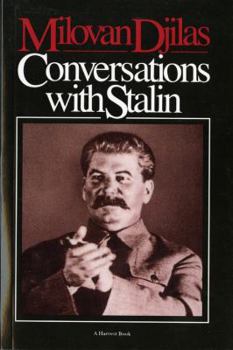Conversations with Stalin
Select Format
Select Condition 
Book Overview
A memoir by the former vice president of Yugoslavia describing three visits to Moscow and his encounters there with Stalin. Index. Translated by Michael B. Petrovich.
Format:Paperback
Language:English
ISBN:0156225913
ISBN13:9780156225915
Release Date:September 1963
Publisher:Houghton Mifflin
Length:228 Pages
Weight:0.55 lbs.
Dimensions:0.5" x 5.4" x 8.0"
Customer Reviews
5 ratings
SUPERB
Published by Thriftbooks.com User , 18 years ago
A SUPERB BOOK BY A MAN WHO WAS AN INSIDER AND CAME TO REALIZE, ALMOST TOO LATE, THE HORROR OF SOVIET COMMUNISM, EXEMPLIFIED BY STALIN. ONE CRITIC CALLED IT A CHARACTER ASSASSINATION, WHICH IS BEYOND RIDICULOUS. JOSEPH STALIN WAS PROBABLY THE GREATEST CRIMINAL OF THE 20TH CENTURY, A PURELY EVIL PSYCHOPATH WHO COULD HAVE CARED LESS ABOUT THE RUSSIAN PEOPLE. HIS ONLY CONCERN ABOUT WW II WAS THAT HE ALMOST LOST. NO, THIS IS JUST AN EXCELLENT CLOSEUP OF EVIL, DO READ IT.
From idealogy to reality
Published by Thriftbooks.com User , 22 years ago
Although I read this as a requirement for one of my classes this semester (East Europe Since 1918), I found it genuinely interesting, enough that I began and finished it in the same day. Djilas was one of the top communists of Yugoslavia, and was part of the first communist foreign missions to the Soviet Union. His book treads from the opening euphoria of the promise of socialism and its new expression, including the near-worship of its manifest leader, Stalin. Then doubts begin to creep in as he is horrified by the actions of the Red Army in his homeland and the relationship that the Soviets--communist comrades--wish to compel upon the Yugoslavs. Quickly this moves to deep disappointment as he realizes that for all their propaganda, the Soviets are truly just a different embodiment of Imperialistic Russia and that the more things have changed, the more they have actually remained the same. His personal insights into the character of the Soviet leaders lend this book a feeling of pathos that goes far beyond its historicity. Here, Stalin is seen as the man that he was, and his monstrosity is only magnified under that understanding.
A great little book
Published by Thriftbooks.com User , 25 years ago
Djilas' first hand account of events, keen observations and great writing style combine to give you much more insight about communism and Stalin than you would expect from a book this size. Don't miss it.
a great book
Published by Thriftbooks.com User , 25 years ago
It was a great book. Gilas was a great. I'm comunist and Gilas opened my eyes.
A Yugoslav Socialist Meets Stalin and Loses His Faith
Published by Thriftbooks.com User , 25 years ago
Milovan Djilas was one of four senior members of Tito's government until his expulsion from the Yugoslav Communist party in 1954 and eventual imprisonment on political charges. He wrote "Conversations With Stalin" in 1961, between arrests. The book is a diary of Djilas' three voyages to Moscow in 1943, 44, and 48. Djilas, his memories no doubt leavened by hindsight, titles the three meetings "Raptures", "Doubts", and "Disappointments", and as these names indicate, the book chronicles his growing disillusionment with Soviet-led socialism. Djilas was an educated man, a sophisticated thinker and a writer. So that when we read passages in the "Raptures" section such as, "My entire being quivered from the joyous anticipation of an imminent encounter with the Soviet Union", it seems clear that he was not the naïf that he makes himself out to be. Rather, given his circumstances at the time that he was writing, he was heightening the sense of his early fascination with all things Soviet so that his later disenchantment is all the more palpable. The book fascinates with its detail. Djilas travels to Moscow as a foreign dignitary to discuss Yugoslav-Soviet policies. He must cool his heels for days before he is finally summoned to meet Stalin, and then the meetings are typically all night dinners with copious drinking and byzantine political subtext to the conversation. Stalin dominates the discussion so thoroughly that when he insists that the Netherlands was not a member of the Benelux union, nobody dares correct him. Djilas recognizes traits of greatness in Stalin, his ruthlessness and far-sightedness. He describes these not out of regard or respect, but because they are precisely the qualities which make Stalin evil. "Every crime was possible to Stalin, for there was not one he had not committed." As doubts begin to creep in for Djilas, he records the development of his own cynicism. "In politics, more than in anything else, the beginning of everything lies in moral indignation and in doubt of the good intentions of others". His portraits of Krushchev, open-minded and clever; of Molotov, Stalin's taciturn lieutenant; Dimitrov, the powerful Bulgarian kept on Stalin's string; Beria, sinister and drunk; and a host of other prominent figures make this book required reading for those interested in the era. The descriptions of machinations surrounding Yugoslav-Albanian-Bulgarian politics and his unflattering characterization of Croatian hero Andrija Hebrang are of great interest to students of Balkan history.






